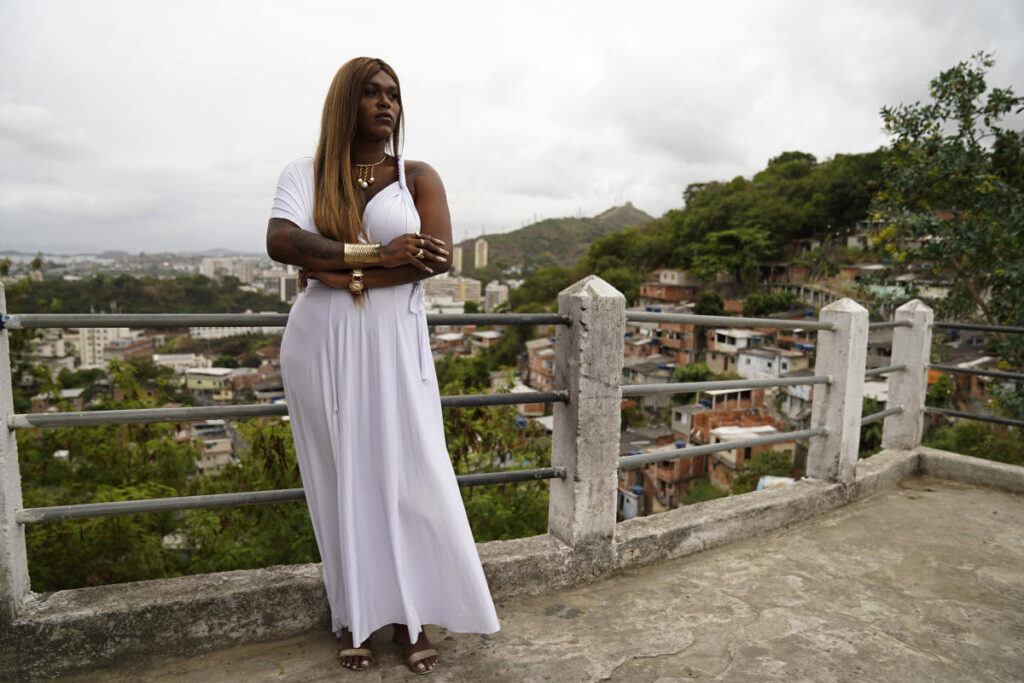RIO DE JANEIRO (AP) — Benny Briolly beamed as she walked through the concrete favela alley in a snow-white dress, volunteers proudly waving campaign flags decorated with her face.
The city councilor and nearly a thousand other transgender politicians are running in each of Brazil’s 26 states on Sunday, according to the country’s electoral court, which is monitoring them for the first time. The number of candidacies has tripled since the last local elections four years ago, when trans rights organization Antra mapped them.
As transgender people set their sights on political office, many are facing intimidation attempts aimed at turning them away, including a candidate in Brazil’s largest city who survived an assassination attempt last week.
Trans advocates report record deaths in Brazil
More transgender people – 100 – were murdered Brazil last year than in any other country, according to Transgender Europe, a network of global nonprofits that tracks the data. These precise statistics are almost certainly driven by a combination of poor reporting elsewhere and Brazil’s active network of advocates, but experts agree that transphobia is pervasive.
On International Women’s Day last year, Nikolas Ferreira — the federal lawmaker who received more votes than anyone else — wore a blonde wig in the lower house of Congress. He said it allowed him to speak as a woman and denounce transgender people.
In 2022, state lawmaker Rodrigo Amorim called Briolly “an aberration of nature” in the state Legislature.
Such tactics rally voters by portraying transgender people as a threat that must be courageously countered, said Ligia Fabris, a gender and law specialist and visiting professor at Yale University.
Legacy of an extreme right-wing president for trans politicians
Both Amorim and Ferreira were staunch allies of far-right former President Jair Bolsonaro.
Transgender politician Leonora Áquilla, candidate for the municipal council in Sao Paulo said this year that Bolsonaro had stoked transphobia and that she had to stare at people shouting death threats in her face.
Bolsonaro lost his re-election offer to links Luiz Inácio Lula da Silva in 2022, but transphobia is far from gone.
Since coming into the public eye, Briolly has received more than 700 death threats. Some have listed the address of her home in the Rio de Janeiro metro area and warned that she would meet the same fate as city councilor Marielle Francoan LGBTQ+ rights advocate who was shot in 2018. That threat prompted the Inter-American Commission on Human Rights to demand Brazil provide Briolly protection.
She won’t fear her re-election bid, even though some may want her dead.
“When we enter politics, our bodies become a threat and we become constant targets,” Briolly told the Associated Press, as the city of Niteroi – across the Bay from Rio – stretched out behind her. “Our bodies are revolutionary, daring… they are bodies that radiate hope to all those left behind.”
An armed escort and a bulletproof vest
Áquilla narrowly escaped an assassination attempt on September 26. She was in northern Sao Paulo on her way to investigate reports of transphobia when a motorcycle deliberately crashed into her car. When she got out, the driver revved his engine and she instinctively ducked. The bullet from his gun missed her and he fired more shots as she lay there and pretended to be dead. He escaped and Áquilla has stopped his personal campaigns.
“There have been so many threats that they have become banal; we never thought this would happen. I’m in complete shock. I am taking a sedative because I cannot control my nervousness and anxiety,” she said in a video call. “Right on the eve of the elections, the moment when I have to take to the streets the most, they try to silence me.”
Duda Salabert, who is running for mayor of Brazil’s sixth largest city, Belo Horizonte, made history in 2022 when he was elected mayor of Brazil’s sixth largest city, Belo Horizonte, along with another trans woman. Brazil’s lower house of Congress. Their victories were widely considered a breakthrough for trans representation, but Salabert said she received daily death threats during that campaign.
“I had to walk with an armed escort… I had to vote wearing a bulletproof vest, according to police instructions, and I was not allowed to enter large crowds because I risked being attacked,” she said.
This year, Salabert said she wants to become the first trans mayor of a major city in Latin America.
“It is a joy because we are making history, but it is sad because our candidacy highlights the entire history of exclusion, violence and alienation of the transvestite and transgender community from electoral processes in Brazil and Latin America,” she said in a video call. .
Positive changes come with violence and fear
Indianarae Siqueira, a transgender sex worker and longtime activist who is running for city councilor in Rio, says seeing transgender people increasingly in positions of power has had a snowball effect.
“Those who managed to win and who are there – I think this is a reference and gives an incentive so that people want to enter politics,” she said during an interview on the steps leading to Rio’s municipal assembly .
Back in the Niteroi favela, Briolly agreed that there is an element of joy in playing an active role in politics, even amid the threats.
“For me it is pride – a latent, powerful pride – that grows more and more in my heart and in the hearts of all who believe that my body and my voice are only a reflection, an empowerment of the collective struggle. she said. “When a black trans woman moves, she moves the entire society.”







